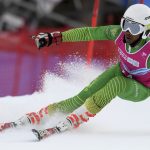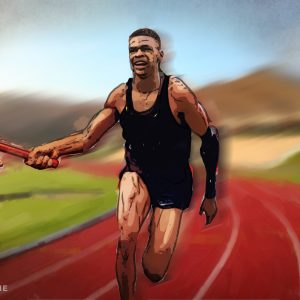Avuyile Ndamase’s tricky relationship with the ocean
The pro surfer from Port St Johns in the Eastern Cape is on a mission to ensure that the ride to professionalism is smoother for black surfers who come after him.
Author:
13 April 2020

The ocean is a place of both torment and healing for Avuyile Ndamase. It’s where he lost a major part of his life, but also where he found himself. A place where he has been reminded of his skin colour and where he has broken the colour barrier.
The ocean has also given Ndamase, a professional surfer from Port St Johns in the Eastern Cape, the opportunity to travel around the world – from Cape Town to California, Hawaii and Bali – to showcase his skill. Through surfing, he is becoming one of the most noticeable black faces in a sport that is viewed as elitist and not all that friendly for people who look like him.
As we walk along North Beach in Durban, everyone carrying a surfboard greets the 26-year-old. “The surfing community is very small. I was once a lifeguard here. I also worked as a coach for young and aspiring surfers who grew up on the streets,” says Ndamase.
Everyone on the pier watches as he starts surfing, mesmerised by his skills. “When I was seven, my parents moved to the beach house in Port St Johns,” he reminisces.
“While we were trying to settle in our new place, my parents separated. My younger brother and I would walk to the beach just to escape from everything that was going on at home. This is where we met other young boys surfing. I didn’t have a surfboard; they would lend me one and tell me what to do. I taught myself how to surf just by looking at other young boys.”

The ocean that was an escape for Ndamase became his tormentor when he lost his brother Zama, 15, who was brutally eaten by a shark in front of him.
“He was a much better surfer than me. I persevered and did surfing in hard times because of him. The minute I take my board and go to the ocean, he is always on my mind.”
He continues. “After I lost my brother, I told myself that I’ll continue surfing, doing it for him. It took me a year to go back to surfing after losing him. I had to move from Port St Johns to East London in order for me to continue with school and surfing. It was one of the difficult times in my life, but surfing was therapeutic because that’s the only language we had with my brother. In good and bad times, we had surfing.”
Memories of the shark attack
Before he could return to catching waves, he had to overcome the waves of emotions that attacked him following his brother’s death. “When I went back to surfing after a year, I felt like I had renewed energy. It was like all his energy was transferred to me. With the things I’ve achieved, I can see that his energy has been really present in my life,” says Ndamase.
“Whenever I go past Second Beach in Port St Johns, all the memories of him being eaten by the shark in front of me come back. I had come out of the water to change my board while Zama was sitting on his about a few metres out.
“Something just pulled him down, but he hung on to his surfboard and fought to stay afloat. He tried to kick it away but it just bit into his thigh. It all happened within seconds as I stood on the shore and watched, frozen with shock. I watched him bleed to death and just float until the lifeguards went on to recover his body.”
Related article:
Ndamase says reaching the level of professional in surfing has been a challenging exercise for him because of limited resources.
“Surfing is a privileged sport. It needs a lot of money for one to reach the top level,” he says. “It’s even harder when you are a black surfer because you live the life of always begging to be in the teams, even if you know you are good enough. It actually discriminates against blacks and the poor.
“I’ve missed out on so many opportunities, especially those of representing my country. From the age of 14, I have never been out of the top 10. At the same time, I never did well enough to be in the top five. Even with doing so well, I always missed the chance of making the South African team because I did not own surfboards. Most of the surfboards I’ve used were a hand-me-down, probably been used for two years.
“Used surfboards are not good for competing, especially when one is representing the country. It’s been very hard getting to a professional level. It’s been all about begging organisers to put me in a competition and promising them that I’ll do well if they allow me to surf. Some turned me down, stating that it’s too expensive. Some allowed me. When given an opportunity, I made sure that I did well and not disappoint those who gave me a chance.”
Paving the way for other black surfers
Ndamase’s success and prominence will go a long way towards opening doors and giving hope to upcoming black surfers. “The struggle is real for African surfers. That is why I want to do so well, so that I pave a way for the next generation,” Ndamase says.
“I don’t want the next generation of surfers to live the life of begging like I’ve done. Surfing South Africa has been talking about transformation in surfing, but we have not seen much of it. It’s been a struggle all the time to make the South African Championships. Even now, I’m not on good terms with them because I questioned why they took me out of the South Africa Championships six days before the competition.
“They said I was racist, hence I was asking valid questions. I was tired as the black surfer for being the other guy. I’m equally as good as any surfer and I’ve got bigger plans for surfing. I’ve put in so many years of hard work – to be taken as the the other guy in something means everything to me. Being a black surfer has been very emotional. When I spoke, they took me out of the transformation programme of which it’s something that didn’t really exist.”
Related article:
Surfing South Africa’s director of transformation, Alvin Mtatshi, disputes some of Ndamase’s claims about the organisation.
“Ndamase’s story is painful and I really understand his frustration,” Mtatshi said. “He is a hard working individual who wants to achieve bigger things in surfing. He has been very lucky when it comes to surfing, he has been able to travel the world with surfing. But I must say that we are working very hard to include almost everyone that is interested in surfing.
“I also feel that if there was something that happened between Ndamase and Surfing South Africa he should have addressed it with us. I am here to listen to all the grievances.
“We are pushing everyone from disadvantaged backgrounds to be on the spotlight. We do have our own challenges but the vision is there. We also need funding to take it further. As Surfing South Africa we always emphasise that we don’t want black surfers as window dressers but we want to see them progress to higher levels. With us saying so, we must stress that funding is not for one person, but it must reach almost everyone that has interest in surfing.”
Before the Covid-19 pandemic brought everything to a standstill, Ndamase’s main concern was getting sponsors in time to pay his affiliations fees before the scheduled start of the season in April.
“I would like to be on the Qualifying Series. There’s never been a black surfer who has chased Series. That is my ultimate goal,” he says. “It will be much easier if I can get sponsors because there is a lot of money involved. I have to pay affiliations fees and have a quiver of surfboards. The Qualifying Series will be the build-up towards doing Ballito Pro, which is one of the biggest events in South Africa. I also want to do some African events, especially the one in Senegal.”
Related article:
Personal glory aside, Ndamase is driven by a desire to leave a legacy. “With all that I am doing, I want to pave the way for the next generation of black surfers,” he says.
“I would like to open a surfing school where I’ll be able to teach young kids how to surf from the age of eight, walk them through how to become a professional surfer, but of course not leaving out the importance of education. I believe surfing should be accessible to everyone who wants to surf.”
The eloquent surfer is grateful his mother allowed him to chase his dream of being a professional surfer. “I never saw myself doing anything besides surfing. I am happy that eventually it paid off. I had never thought that I would be paid to travel the world and get paid to surf even if there is no competition. I am grateful that my mother never pressured me into doing anything, but she supported me when I told her that I wanted to be a surfer.”

Correction, 15 April 2020: This article has been amended to include Surfing South Africa’s response as well as correct the move Ndamase was displaying in the ocean.



